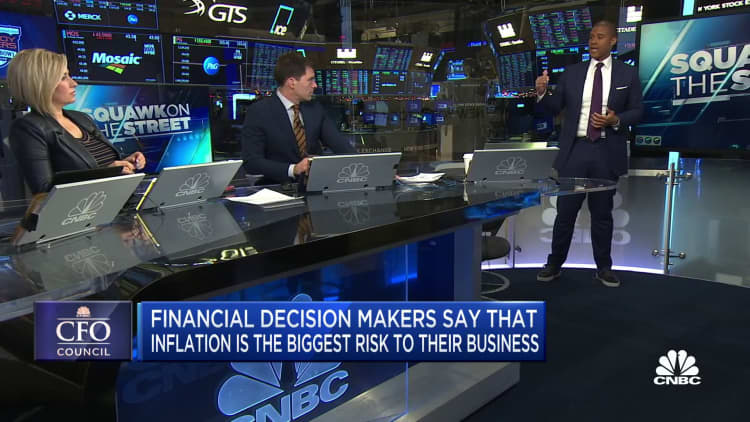Every time the stock market has rallied off a low in 2022, it's headed right back down again. High hopes among investors that the worst is in have turned into head fakes amid the highest interest rates in 15 years. The current slump for stocks ending the year is just the last example, and the selling isn't over yet.
The latest damage to the Dow Jones Industrial Average will get worse before it gets better, and even as the Fed's battle with inflation is leading to success, it will come at the price of a hard landing for the economy next year, according to a new survey of chief financial officers conducted by CNBC.
The results of the latest quarterly survey of CFOs are not a surprise. Throughout 2022, conversations with individual CFO Council members have more often than not tended to the view that the economy is headed for a hard landing. At the recent annual summit in Washington, D.C. on Nov. 30, polling in the room showed that the majority of CFOs remained of this view.

The CNBC CFO Council Q4 2022 survey is a sample of the current outlook among top financial officers. It was conducted among 23 chief financial officers at major organizations between Nov. 30 and Dec. 20.
Here are a few of the details.
Recession is coming
It's been remarked that no recession has been more predicted than the one that still hasn't hit the economy. Include CFOs in this camp of prognosticators. More than 80% of respondents to the Q4 survey expect a recession in 2023. That percentage has increased quarter over quarter as more CFOs pushed back earlier forecasts that the economy already had entered a recession. CFOs are divided on the timing, with equal percentages (43%) saying the recession will hit in the first half or second half of the year.
Whenever a recession hits, the timing is less important than the survey finding that less than 10% of CFOs think a soft landing — the idea that the Federal Reserve can cool economic conditions, bring down inflation and bring up unemployment without sinking the economy — is possible.
More Dow selling
CFO views on recession imply more pain for a stock market that is ending the year with another volatile turn down in value. More than half of CFOs (56%) polled expect the Dow Jones Industrial Average to fall back below 30,000 again before it ever reaches 40,000 for the first time, and that's close to triple the number of CFOs (21%) who think the worst is in for the market or chose not to make a call on stocks in the survey.
But the outlook isn't all gloomy. In a few key areas for the economy and markets, CFOs do think the worst is in. For example, with inflation.
Inflation has peaked
While it remains the top external risk factor cited by CFOs — and cited by more CFOs in Q4 — nearly two-thirds of respondents now say inflation has peaked. And CFOs do believe that despite the cost to the economy and stock market, the Fed is doing a better job. More than half of CFOs now rate the Fed's handling of inflation as "good" or "excellent," a major improvement. CFOs who described the Fed's efforts to control inflation as poor dropped from roughly one-quarter of respondents in Q3 to under 10% who hold this view now.
Political risks won't tank the market
One reason why inflation was cited by more CFOs as the biggest external risk factor their businesses face: another risk went down 10% quarter over quarter, the risk of over-regulation. The midterm elections and divided government may be responsible for this diminished fear.
On other key political risks on the horizon in 2023, CFOs believe the headlines will be worse than the reality. A vast majority of CFOs (over 80%) say a government shutdown is unlikely in 2023, and they also think that it is unlikely – more than half say it's "very unlikely" – that Congress would fail to raise the debt ceiling, a view held by over 90% of respondents. That mirrors the view offered by Kevin Brady, the outgoing top Republican on the House Ways and Means committee, who told chief financial officers at the recent CNBC CFO Council Annual Summit in Washington, D.C., that it was "economic fear-mongering."
"The bottom line is our debt will be paid on time. … I don't anticipate a 2011 or even 2018," Brady said.
Companies will still spend and hire
As the economic situation and stock market weakened this year, one set of findings that has been consistent in the CFO survey is relatively stable spending and investment plans. This remains the case in Q4.
Less than one-quarter of CFOs expect their company's spending and headcount to be reduced in 2023. That's not to say companies aren't being more cautious. An equal percentage (roughly 40%) of CFOs say their spending and headcount will remain the same next year as those who expect it to increase.






